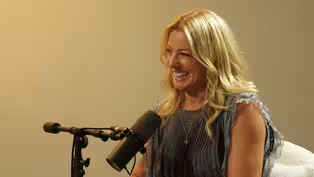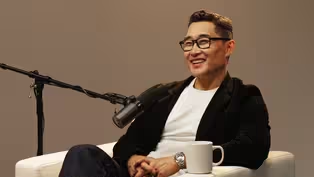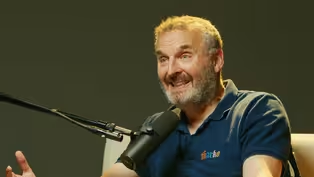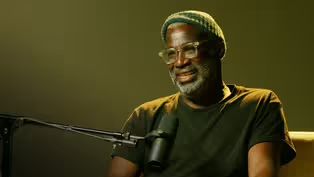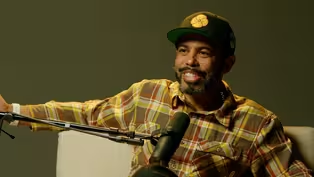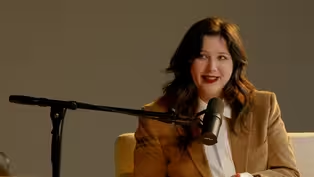
How Natasha Rothwell’s Life Brought Her to “The White Lotus”
Special | 33m 40sVideo has Closed Captions
Actress Natasha Rothwell on her creative process in "The White Lotus."
In this episode, Natasha Rothwell shares how she connects to Belinda’s journey of self-discovery in "The White Lotus" and how she collaborated with creator Mike White to bring greater nuance to the character. She reflects on the importance of diverse storytelling in Hollywood, the inspiration she drew from actress Nell Carter, and why she believes the arts are an empathy machine.
Problems playing video? | Closed Captioning Feedback
Problems playing video? | Closed Captioning Feedback
Support for American Masters is provided by the Corporation for Public Broadcasting, AARP, Rosalind P. Walter Foundation, Judith and Burton Resnick, Blanche and Hayward Cirker Charitable Lead Annuity Trust, Koo...

How Natasha Rothwell’s Life Brought Her to “The White Lotus”
Special | 33m 40sVideo has Closed Captions
In this episode, Natasha Rothwell shares how she connects to Belinda’s journey of self-discovery in "The White Lotus" and how she collaborated with creator Mike White to bring greater nuance to the character. She reflects on the importance of diverse storytelling in Hollywood, the inspiration she drew from actress Nell Carter, and why she believes the arts are an empathy machine.
Problems playing video? | Closed Captioning Feedback
How to Watch American Masters
American Masters is available to stream on pbs.org and the free PBS App, available on iPhone, Apple TV, Android TV, Android smartphones, Amazon Fire TV, Amazon Fire Tablet, Roku, Samsung Smart TV, and Vizio.
Buy Now
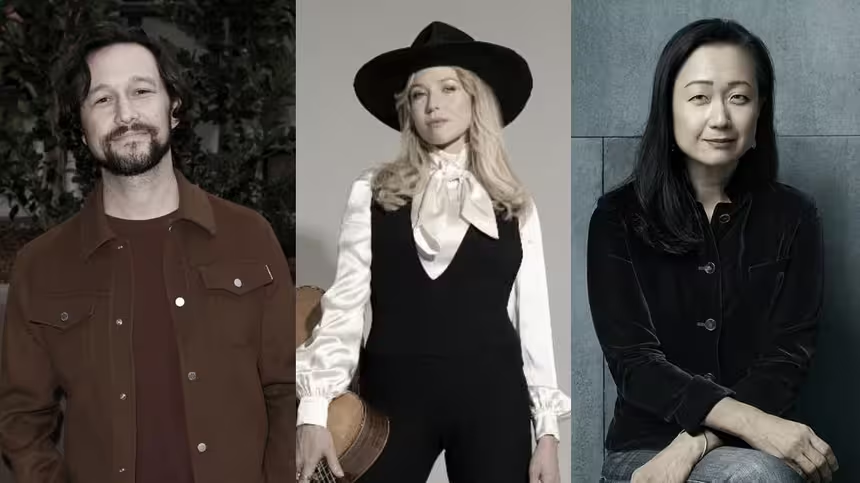
A front row seat to the creative process
How do today’s masters create their art? Each episode an artist reveals how they brought their creative work to life. Hear from artists across disciplines, like actor Joseph Gordon-Levitt, singer-songwriter Jewel, author Min Jin Lee, and more on our podcast "American Masters: Creative Spark."Providing Support for PBS.org
Learn Moreabout PBS online sponsorshipMore from This Collection
Sarah McLachlan: Making Music to Connect and Heal
Video has Closed Captions
Singer-songwriter Sarah McLachlan opens up in a candid interview about making music. (37m 19s)
Daniel Dae Kim Leads Spy Drama and Fights for Industry Change
Video has Closed Captions
Actor Daniel Dae Kim on his groundbreaking career and new project, "Butterfly." (21m 48s)
Phil Rosenthal’s Secret Recipe: Good Food and a Laugh
Video has Closed Captions
TV writer and host Phil Rosenthal talks about finding our shared humanity in food and comedy. (22m 53s)
Tunde Adebimpe Channels His DIY Roots Into Raw Solo Debut
Video has Closed Captions
Musician Tunde Adebimpe on his creative process behind his solo album debut. (37m 28s)
Daveed Diggs Takes on Cyberpunk Rap
Video has Closed Captions
Rapper and actor Daveed Diggs on his creative process as a rapper and songwriter. (25m 28s)
Lucy Dacus Makes Her First Loves Songs
Video has Closed Captions
Singer-songwriter Lucy Dacus talks about love songs for her new album, "Forever is a Feeling." (23m 49s)
Providing Support for PBS.org
Learn Moreabout PBS online sponsorship- We still haven't completely tapped the potential of art.
I feel like, from "Water Lilies" to Lily Tomlin, like, it's all awesome.
(bright music) - I'm Joe Skinner, and this is "American Masters: Creative Spark."
And that's Natasha Rothwell.
She's an actor, comedian, writer, producer, a multihyphenate creator who you most likely know best from HBO's "The White Lotus."
Rothwell plays Belinda in seasons one and three and has earned an Emmy nomination in both cases.
She's one of three characters to recur across the sprawling ensemble series, which has captured America's attention with its cutting look at the tensions between wealth, privilege, and morality.
I spoke with Natasha to see how she was critical to that vision.
Thanks so much for coming in.
- I am very thrilled to be here.
- I'm sure it's been a long run talking about "White Lotus."
- It has, but I never get tired of it.
- Yeah?
- Yeah.
I think I had season two to catch my breath, so.
- True, true, true.
Why do you think it's such a popular thing to talk about?
- I mean, I think a lot of it is escapists.
I think it's a world of very privileged people with big problems and that kinda feels fun, I think, to see that demographic struggle with their choices.
And I think Mike tapped into something during Covid that was escapist, and also he poses a lot of sort of moral questions and no answers.
And I think people love to talk about it.
- Belinda does really feel like the moral center of this story in a lot of ways.
And what was your first encounter with Belinda as a character back in the first season?
- I never auditioned for the show.
I just took a meeting.
At the time I was wiping down groceries with Lysol wipes and scared to leave my house.
And I didn't know what to expect from a character that is diverse in a mostly homogenous environment.
And I was worried, you know, at first.
And then he spoke about her and she felt very familiar and you know, her timidity and her desires having gone unspoken for so long.
And that really resonated with me.
And then I read the script and I was just blown away.
I also wanted more from her on the page.
Not in that the story wasn't there, but I just knew that, you know, I wanted to infuse a Black female perspective on the lines that were already there.
And luckily Mike is just an amazing collaborator and he jumped at the chance to sort of work with me on the pages and have it feel a little bit more 10 toes down.
And meeting her through his description of her, I really was hearing myself.
And then, yeah, when I read, I was like, "Oh, I know this girl."
I used to be her a little bit, afraid to speak my mind and just walking around chock-full of dreams and trying to reconcile, you know, your current reality with where you ultimately want to be.
- What I'm hearing is you're having a lot of fatigue?
- Yeah.
I feel like taking a nap right now.
- Why do you think you're so tired?
(peaceful music) - I think it's 'cause I'm so close to the floor.
- In general.
- Let's talk about that Venn diagram between you and Belinda.
What do you see at that center?
- Longing to be seen.
- [Joe] Mm-hmm.
- And known fully, and fundamentally wanting to help people at the end of the day, I think that we overlap in that area.
And I do think that, there's a timidity that she has to have at work.
She can't really sort of use her voice fully because it's a form of Kabuki theater working at a resort like that, she has to perform the role.
And I think I've been in a lot of spaces where I've felt that, where I have to be really aware of how I come across in this industry and otherwise, you know?
So yeah, there's definitely been moments where you have to swallow blood and be really thoughtful about how you put things when you're a person of color in a mostly white environment and your job depends on it.
And so we definitely overlap in that sense of self editing.
I think, you know, where we differ is I've had 20 plus years of therapy and now I really don't give a (beep).
(laughing) And I speak my mind.
But it took me a long time to get there, you know?
And so it was interesting to revisit that version of myself that was a little more gun shy.
And then I felt like in season three, so much of what was percolating underneath the surface was able to sort of come out and we get to see a little bit more of her personality, you know, because she's in a different country and she's auditioning this new version of herself.
(bright music) - I feel really lucky to be here.
I wanna learn everything I can and bring the magic back to Maui.
- In season one, I remember first watching the show and really starting to sink my teeth into it when you see how much it's about the workers in the space.
And to see that journey into season three is really compelling.
- Yeah, absolutely.
I think there's such a wealth gap, right, between the people who frequent those establishments and the people that make 'em run.
And I think, season three, I think brings that to the surface because you have Belinda there in a work capacity, but she's dipping her toe into this lifestyle.
You know, we get to see her having dinner next to everyone else who's there having dinner.
And, you know, she's auditioning this idea of what it would be like.
And I think it can be intoxicating, especially given her proximity to that level of affluence.
And so, I think Mike does something so interesting with that this season, especially given where it's shot.
You know, it's such a diverse place, Thailand.
You know?
It's beautiful.
And one of the things I learned when I was there is that Thailand has never been to war and it's never been colonized.
And so to juxtapose that as the location versus season one, where I feel like the US is in a constant state of trauma response, you can have those conversations about class and identity and race from a place of, you know, seeming neutrality.
And I think that does allow Belinda to dream a little bit bigger and to take bigger swings because she's not being sort of encumbered by ideas of what she should and shouldn't do.
And I think Mike sets the table for that in a way that doesn't force people to draw any specific conclusions.
You know, he lets people sit with that, and sort of witness the difference that that kind of environment can make on someone.
- Belinda takes on such a different scope once you're introducing her child as well.
- [Natasha] Mm.
Yeah.
- How did that change how you thought about the character?
Did you know that she had a child in season one?
- Yeah- - I guess there was a phone call, right?
- Yeah, it was a brief phone call.
But the things that weren't discussed were, you know, how old he was, what he would look like.
And I remember when Mike told me that Nicholas was cast and I saw a photo and I told him, I was like, "You know what this means for Belinda?"
He was like, "No.
What?"
And I was just like, "She's a very young mom."
And he was like, "Okay."
'Cause in his mind, he's like, who would play that character?
And I'm sure at some point he thought through those.
But that's obviously my first thought.
And Nicholas is biracial.
And I was just like, that also says a bit about Belinda and the choices that she's made in the past.
And it just informs me of just like how she moves and maybe where her triggers lie.
I did love how Mike painted their love for each other and how, given that she was a young mom, the line between parental and fraternal are blurred and, you know, there's a friendship there.
It was really beautiful to see that develop with the both of them, especially 'cause the first time we see them together, she's in bed with someone and he walks in.
So there's a real kind of like, how are they gonna handle this?
And it's done with such humor and just an acknowledge of each other's humanity, which I don't think we really get to see.
- [Joe] And of course, Belinda's journey this season ends in a note that people are debating.
Some see it as triumphant, getting the money she deserves, others as morally complicated.
She accepts a payout from Greg, a guest who is essentially buying her silence around a murder.
- Belinda is seen as such a moral center and her decision to take blood money feels pretty amoral, right?
And I think the beauty of how she comes to that conclusion, it comes from a place I think of righteousness, of what she feels is owed to her after what happened in season one.
But also I think that, especially in the moment when she decides to take the money, she's in a position I think she's probably never been in before, where she has the upper hand on a very rich white man.
And I think that also is intoxicating.
And I don't know what the effect of the money will be on her.
My hope is that karma isn't too much of a (beep).
(laughing) But I think it's a joy to play someone who, even though they did, you know, something that wasn't technically above board, they're still rooting for her.
You know, they're still so thrilled that she finally got some compensation.
And for me, my thrill for her is that I think when the real estate of your mind is not occupied with how are you gonna pay your bills, I think you can fill that up with dreams.
And I don't know if she's gonna open her own spot.
I think that's what she thought she wanted to do, because it's prudent, you know, a business can make money and she has bills.
But when you don't have the obligation to be, you know, prudent in your spending and you can just dream a little bit bigger, I think that's what I'm excited about.
And I think she says it perfectly to Pornchai when she's just like, "My circumstances have changed."
- [Joe] Hmm.
- And I think she's going to figure out what she wants the next chapter of her life to look like.
But yeah, it was just such a joy to get to put her back on and play her.
I didn't think I'd get the opportunity and to have audiences still love her as much as I have.
It's been such a treat.
- I love talking to actors about their characters because when you're talking with friends about a show like this, everyone is going to say, "Wow, these characters are such jerks."
Or there's like, "They're really flawed characters," right?
That's pretty common with our media landscape these days.
- Yeah.
- But I love that actors are finding ways into characters, you know, in a more empathetic lens, through a more empathetic lens.
So, you know, I'm just curious to unpack that a little bit, what your thoughts are on just, I guess broadly speaking, the power of art to be a way towards empathy rather than hate.
- No, absolutely.
I think a huge part of the mission of my production company, with Big Hattie Productions, is to center marginalized voices and to really emphasize, you know, those characters that existed in the periphery of many stories before and giving them center frame.
And I think it does two things.
One, it does elicit empathy and understanding for people who may not look like you.
But it also does something I think, which is far more powerful.
It allows those individuals who may look like those characters that existed on the periphery to feel seen.
And the power of visibility, it's why I'm sitting across from you right now.
Had I not seen Nell Carter in "Gimme a Break!"
in the '80s, seeing this plus-size Black woman in a role of servitude, but who was higher status than the head of the household, who was funny and moving and self-possessed and sexy.
I would never imagine that I could also pursue this line of work with the potential of that being an outcome.
And so I think with empathy and visibility, one empowers the viewer and the other empowers, you know, someone who's probably projected themself on that protagonist and feels like they have some agency in their own life to make decisions that could lead to that.
You know, it's like if you can see it, you can be it, in a lot of ways.
And so I think that process for me has been really cool.
And I think the conversations, characters, you know, that are othered in some way, BIPOC, LGBTQIA, like disabled, allowing those stories to be told.
It's also, I think at times hard for me to contextualize that in how it might help someone else.
For me, I'm just like, the power of that for their communities is what I get excited about and that agency that it can elicit.
And I also think it's just more realistic when you have a more diverse landscape in television that can speak to things that the past hasn't.
I think it's real life.
It feels more authentic.
Which is why I think, you know, so much of the diversity, equity, inclusion cuts that have been made in and around Hollywood are devastating to so many people because I think it allowed those voices to have some space, you know, to take up space.
- What was the first spark that got you excited to be a comedian and an actor when you were growing up?
- Well, I have been performative my whole life.
My dad was an early adapter in terms of technology, so he had one of the giant video cameras on his shoulder with a huge VHS tape.
And there's footage of me very young, like being a ham in front of the camera.
And I'm one of four.
And we were an Air Force family, so we moved around a lot and often had to entertain ourselves on long car trips.
And we would play this game called Make Me Laugh, where you would sit in a chair and everyone would try to make you laugh.
And I was obviously the winner of that always.
So there's little clues I think when I look back when I was really, really young that it's always been in me.
And then as I got older, I was just drawn to it.
I would do like liturgical plays, and then I did plays in middle school and in high school.
I also think I loved being able to escape into a character.
I grew up pretty religious and there were so many rules.
And when you're performing you can get away with saying and doing and being anything 'cause it's a character.
And so it definitely was an exhale for me to escape in some characters, just to be more of myself, instead of performing a version that I thought I was supposed to.
So it was very addictive when you meet yourself through a character or explore parts of yourself that you were unfamiliar with, you know, on stage.
And I just, yeah.
And then I got into improv in high school and that also was a be in the flow, be in the moment, no censorship, kind of just freeing.
And so the arts have always been, I think, calling me and from a very, very young age.
- Hmm.
- And then I put a ring on it when I majored in it in college.
(Natasha and Joe chuckling) - I moved around a lot when I was a kid.
- Mm.
- What is it about moving around that sort of compels us towards performance and being on stage?
I also did improv in middle school and high school, and I'm just curious, you know, I think it is a specific thing.
- It's a specific thing.
I think it's a couple things.
One, I think theatrical artistic communities are some of the most open and welcoming.
And so in showing up to a new school, I went to two high schools, two middle schools, two elementary schools, and showing up to one of them, the theater department was always just like, "Welcome."
You know, like freaks, geeks, others, come on.
And it was just so, just welcoming.
And I do think that, whether consciously or unconsciously, even outside of doing theater proper, when you move to someplace new, you get to audition a new version of yourself socially.
At this school, I'm gonna wear two socks, I'm gonna slouch 'em and they're gonna be mismatched.
Or, you know, whatever the case may be.
And I remember I dyed my hair black and I was just like, "Yeah, that's who I'm gonna be here."
And there was this sort of, you get into the habit of performing, even when you're not performing.
And what was interesting is when I was with my theater tribe, wherever that may be, I felt more authentic than when I was moving through the hallways as just Natasha.
Because that version was trying to be accepted and be liked.
And the other I was already accepted and liked, I could just be.
And so it was very, yeah, it's always been with me.
- Wow.
I just find that deeply resonant.
That idea of when you move to a different place, you really are able to kind of, or forced in some ways, to try on different versions of yourself and that is so similar to performance and acting.
- Yeah.
Yeah.
I remember the move from Illinois to Florida and it's just regionally different.
- Mm.
- So it was just like, I'm gonna say y'all when I'm in Florida, you know, fixin'.
And so it was just this, what are the slight, like you're learning and I learned to pick up very quickly.
And this is before I knew I was neurodivergent, it was just, I'm a good mimic.
And so it would just be like (laughing) coming home and my mom's just like, "You got a twang."
I'm like, "I guess."
(laughing) - You mentioned religion too, and I'm just curious how you see art as a spiritual release?
- Yeah, I think for me, letting go, I think of the shackles of religion and focusing more on faith is sort of where I found myself.
And I feel like writing and performing is a spiritual practice for me.
That's what it's become.
And I feel very connected to being in flow when I'm putting pen to paper, or if I'm like improvising a character as I'm trying to write it.
Or if I'm across from someone on screen and we're just locked in.
I do think that that is, yeah, a physical manifestation of something going on outside of myself.
And I believe in something bigger.
And I do think art is a way for me to tap into that.
Sometimes I, you know, to get really woo-woo about it, I do feel like there's stories being told through me, you know, like being able to tap into feelings that are deep or storylines that are bigger than my lived experience, but I can communicate in a way that they're being received.
It feels like purposeful and it just brings me a lot of joy.
And I think that that is kind of the difference between, I think religion and faith.
I feel like religiosity is kind of joyless and I feel like having faith and that optimism of something bigger and being able to share and give love through the work that you do is joyful for me.
It's life giving and joy giving.
So, yeah.
- So then when did improv come into your life?
- High school.
Mandy O'Neill was my high school theater teacher, and she introduced improv.
And it was like, it was addictive.
It was just like, loved being able to allow the quickness with which my mind works, like having a home for that.
And with improv it just moves so quickly and so much of it is, you know, intuition and being locked in with your teammates, anticipating needs, and holding a lot at once.
Mentally it was like putting more weight on the bar.
And that to me is when, that activates me all the time.
You know, like, give me a deadline, give me like, you know, give me something difficult.
It just, I feel like I'm firing on all cylinders and improv did that for me.
And I love making people laugh.
Like I think that I was always, it always brought me joy to make my siblings laugh, my parents laugh, and yeah, to take an imaginary circumstance and play it with commitment and trust, you know?
It elicits so much trust and just really good storytelling.
I think it's one of the, I still use it as a tool in my writing.
I use it as an actor.
I will improvise into the dialogue on the page just so that way there's a flow.
So it's a tool in the craft, but just as an art form in and of itself.
I love it.
I love it so much.
And I haven't been able to do it in a long time, but yeah, it's the best.
- What is it about having a sense of urgency or an immediate deadline in front of you that can make your art and your work better?
- I don't know.
It lights up my switchboard of my brain.
It really does.
It also, it can allow me to circumvent the inner critic.
I remember when I was at "SNL," just the sheer amount I had to generate in a week.
I had to move quickly.
It was like a deadline every day.
And that doesn't really give space for your inner critic to be like, "You sure about that semicolon?"
It's like, "(beep) like, you gotta move."
And so you just have to, it is, yeah.
You just have to do it.
And so, and I do think it, like, as I'm learning myself, as someone who is neurodivergent, I did this full like neuropsych eval to get my, you know, diagnosis last fall.
And one of the tests, it's like three weird symbols and then like a line of a bunch of word symbols and it's like, how quick can you find them in each other?
And I turned in my thing and the neuropsych's looking at me and like the paper and she's like, "Are you always this fast?"
And I was just like, "Oh no.
Was I like fast and wrong?"
And she was like, "I've been doing this for 20 years and I've only ever graded to page four and you got to page eight."
And I was just like, "Is that a bad thing?"
She was like, "Your brain works very, very fast and so it'll be bored by things that don't activate that."
So I think that also is why procrastination can be such a motivator because it's like, my brain is just like, "Uh-oh uh-oh, oh, let's go."
And like everything's starting at once.
But I try to be better about it and find other ways to- - Right.
Very relatable.
- To spark me, yeah.
- Find that very relatable.
Finding that diagnosis for yourself, was that sort of like, how did that open things up for you?
Give you a better understanding of yourself?
- Oh, massively.
I think my whole life I've felt like I saw the world a little different or like my brain worked a little bit different.
And only later in life I would jokingly just be like, "I'm neuro-spicy," 'cause I didn't have a diagnosis and I was just like, almost try to warn people or apologize about how I move and how I work.
And not that it's crazy or irrational, but it's just, yeah, I just see the world a little bit differently.
And I think for me, having the ADHD diagnosis and I didn't get diagnosed with autism, but I have a lot of autistic traits, having just that understanding has allowed me to advocate for my needs instead of apologize for them.
I think also taking pride in the superpower that it is to have ADHD and have a brain that just sees things differently.
And I think as a creative, it's particularly useful because my ideas aren't coming from sort of a standard pathway.
It's sort of looking at things from different angles.
And I, again, it's a new-ish diagnosis, but it's just named something that I've always known.
- [Joe] Hmm.
- And so there's a lot of validation in just like understanding that there's a word for how I feel, to describe, you know, the way I move and there's also medication to help, you know, and that also was revelatory of just like, "(beep), they're running around here with this much silence in their brain?"
(Joe chuckling) Like what?
Like, I couldn't believe it.
And it is also tinged with grief, right?
Because I look back at a girl who struggled so hard to appear very normal.
And I was in a lot of like gifted and talented, like advanced classes.
I was good academically, but underneath the surface of what I was presenting was just a (beep) ton of work to make deadlines and, you know, fight against myself to show up in a way that would be acceptable.
- Hmm.
- So it's been a journey, but I've made it a part of my personal mission just to try to talk about it as much as possible to just destigmatize it.
Not just for others, but for myself.
- [Joe] Mm-Hmm.
- Yeah, I think it's just, I didn't think I would be getting to know myself in newer ways at this age, you know?
So it's been pretty neat.
- Natasha Rothwell's career has been a whirlwind over the past 10 years, really kicking off with a stint as a writer on "Saturday Night Live."
From there, she had a main role in HBO's "Insecure," and wrote for it, tons of guest appearances in shows like "BoJack Horseman" and "Brooklyn Nine-Nine," a recurring role in the "Sonic the Hedgehog" movies, her own show on Hulu called "How To Die Alone."
And ultimately, her Emmy-nominated work in "The White Lotus."
She had to grind to get here.
So I wanted to look back to right before things really took off, when her main bread and butter came from teaching.
- I taught high school theater in the Bronx for four years, and before that was like a teaching artist at some theaters.
And it's the best, it's just the best, because I just remember, you know, when Ms. O'Neill would light me up with an exercise or, you know, draw me out of my comfort zone, being able to do that and watch other people do that, it's just a joy.
And after I finished teaching there, I taught a bunch with Upright Citizens Brigade, and then work took over and I couldn't really do that anymore.
But yeah, it's a huge part of how I see the world, as a way to give back and share.
- What would be the most important thing you'd hope to impart on a student?
- When I left, I just remember having this conversation with the folks that I was leaving behind and I was just like, "I'm telling you guys to go chase your dreams.
And in no uncertain terms compromise what it is you feel like you've been put on this Earth to do."
And I left and I think I was just like, "This is what this looks like," you know?
And it was a very scary thing because I wasn't leaving to go, you know, write for "SNL."
I left to nanny, to do like, to really grind, so I could audition more and like make space in my life for the dreams that I had.
And so I think that is the lesson that I left them with, by example of just, everything that I was doing with them was feeding a bigger dream.
And I just am grateful that I didn't allow fear to keep me there.
- Mm.
- Yeah.
- Well, I'm gonna ask one last question before we go.
It's kind of a stupid one.
- What (indistinct) question?
- Sometimes I'll ask it and sometimes I won't.
But because "White Lotus" just makes me think so broadly about the purpose of art, because there's so many different ways to read into the show, it just makes me wanna ask that to you.
Like, what do you think is the purpose of art and storytelling?
- That's the opposite of a stupid question.
(Joe and Natasha laughing) It's kind of a great question.
Hmm.
I think art, when it's good, and even when it's bad, I think it speaks on our behalf.
It can articulate things that perhaps we can't.
I think, it can make sense of a lot of things that are senseless.
I just think it's just, it's a tool.
It's a, it's a gift.
Yeah.
It really, really is.
I think storytelling and the power of the pen and authorship of that story, it's a gift, it's a gift, and I don't take it lightly.
I think that, we still haven't completely tapped the potential of art.
I feel like, regardless of the genre, I mean, or medium, from "Water Lilies" to Lily Tomlin, like, it's all awesome.
- Thank you so much for coming in.
- Thank you for having me.
(bright music)
Support for PBS provided by:
Support for American Masters is provided by the Corporation for Public Broadcasting, AARP, Rosalind P. Walter Foundation, Judith and Burton Resnick, Blanche and Hayward Cirker Charitable Lead Annuity Trust, Koo...

